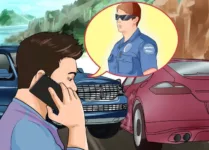Most people are completely unprepared for the stress of a car accident. Leaving aside for the moment the disorientation of no longer having a vehicle, possibly being injured and facing all kinds of potential financial, legal and scheduling problems as a result of vehicle damage and circumstances, the average driver is tremendously vulnerable in the minutes and hours following a collision.
Here are some things to keep in mind if you are in a car accident.
Time is Crucial
If there are injuries, seeing to the safety of everyone involved is the absolute top priority. Police and emergency services should be contacted at once. If drivers, passengers or bystanders are in immediate danger, they will need to be protected. Vehicles that might be in contact with hazards should be moved if possible, or evacuated otherwise. Then comes the hard part.
Listen Instead of Talking
Even if you have legal training, you can’t possibly know all the permutations of risk, civil liability and/or criminal liability in the immediate aftermath of an accident. When you do consult an attorney, they will be thankful if you heed the advice to keep your mouth shut. Answer no questions. Consent to no searches of your person or property. There will be plenty of time for that later.
Law firms like Christensen &Hymas are necessary to evaluate any potential civil or criminal risk. What you should be doing over and above anything else is gathering as much information as you can. Interview everyone at the scene. Get their personal information and obtain some means of contacting them later. This goes for any emergency personnel including police officers, as well as tow truck drivers, potential witnesses and passengers. If they make a statement to you, make some record of it with time and date so you can refer to it later.
Photograph Everything
You have an advantage in this day and age other drivers have never had, and that is the presence of a photography studio and television station in your pocket. Your mobile phone camera has unlimited film. Use it. Photograph everyone’s paperwork, including insurance cards. Photograph every vehicle from every possible angle, taking special care to get license numbers and VIN numbers if you can.
Then take pictures of the surrounding area, taking care to note any nearby surveillance cameras, streetlights, addresses, road conditions, street signs and intersections. Get pictures of conspicuous bystanders. Get pictures of the weather conditions and lighting in the area.
It may not seem all that important at the time, but four months later you will be able to paint a contemporary picture of the accident scene equal to or better than the police, and that could be the difference between an accurate account and an unfair financial penalty.
Consult a Qualified Attorney
Take copies of your records to a competent attorney and get your statement on the record as soon as possible. Let them do the talking from that point forward. This will prevent you inadvertently entangling yourself in an alternate version of events that might be inaccurate or unfavorable to your side the story. This goes for your discussions with insurance companies, including your own.
None of these things will make a car accident any less stressful, but these steps, taken in the right order will definitely reduce the chances a car accident will turn into a medium-sized financial and legal disaster.








